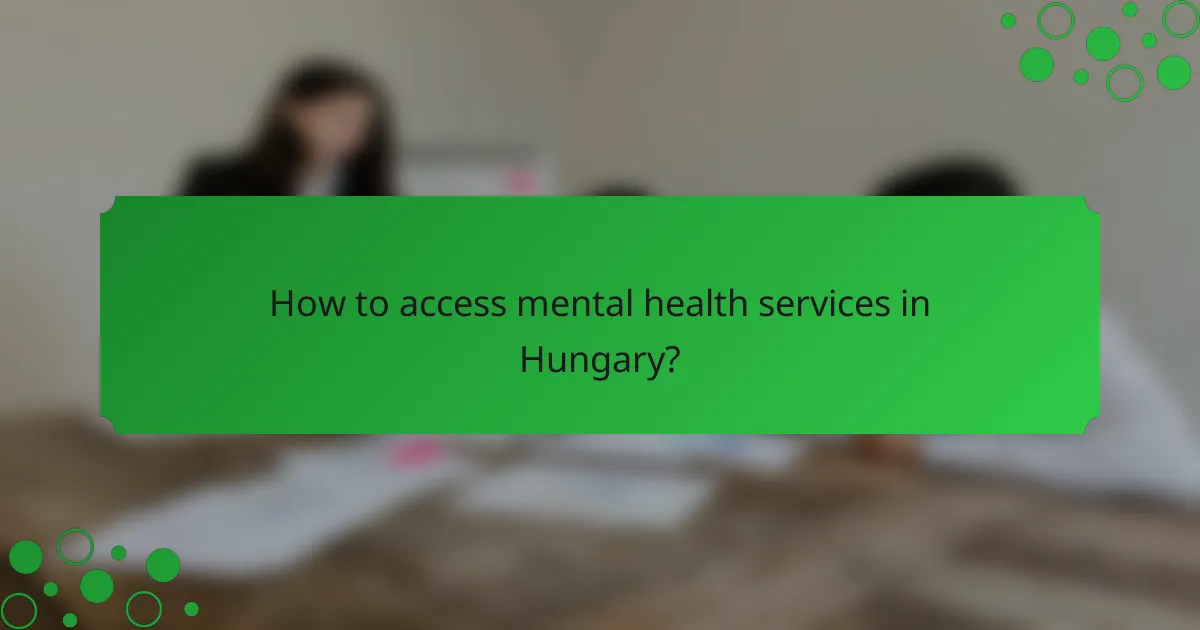Magyarországon számos mentális egészségügyi szolgáltatás érhető el, mint például pszichoterápia, gyógyszeres kezelés, támogató csoportok és távgyógyítás. A szolgáltatások igénybevételéhez gyakran szükséges egy háziorvosi beutaló, és fontos tisztában lenni a biztosítási követelményekkel a megfelelő támogatás eléréséhez. A mentális egészségügyi szolgáltatások fedezete különböző lehetőségeken keresztül valósulhat meg, beleértve a közfinanszírozott és magán egészségbiztosítást, valamint a saját zsebből történő költségtérítést.

What mental health services are available in Hungary?
In Hungary, a variety of mental health services are accessible, including psychotherapy, medication management, support groups, and telehealth options. These services aim to address different mental health needs and can be provided by public and private providers.
Psychotherapy options
Psychotherapy in Hungary encompasses several approaches, such as cognitive-behavioral therapy (CBT), psychodynamic therapy, and family therapy. Sessions are typically conducted by licensed psychologists or psychiatrists and can vary in length and frequency, often ranging from weekly to bi-weekly sessions.
Costs for psychotherapy can differ significantly, with public services generally being more affordable, sometimes requiring only a nominal fee, while private sessions may range from 8,000 to 20,000 HUF per hour. It’s essential to check if your health insurance covers these services.
Medication management
Medication management involves the prescription and monitoring of psychiatric medications by healthcare professionals, such as psychiatrists. This service is crucial for individuals with conditions like depression, anxiety, or bipolar disorder, where medication can play a significant role in treatment.
In Hungary, medications are often subsidized by the government, reducing out-of-pocket costs for patients. Regular follow-ups are necessary to adjust dosages and monitor side effects, ensuring the effectiveness of the treatment plan.
Support groups
Support groups provide a platform for individuals facing similar mental health challenges to share experiences and coping strategies. In Hungary, these groups are often facilitated by trained professionals or peer leaders and can focus on specific issues like addiction, depression, or anxiety.
Participation in support groups is typically free or low-cost, making them an accessible option for many. They can be found in community centers, hospitals, or through non-profit organizations, offering a sense of community and shared understanding.
Telehealth services
Telehealth services in Hungary have gained popularity, especially since the COVID-19 pandemic, allowing patients to access mental health care remotely. This includes virtual therapy sessions and online consultations with psychiatrists, which can be more convenient for those with mobility issues or time constraints.
Many providers offer telehealth options at similar rates to in-person visits, and some health insurance plans may cover these services. It’s advisable to ensure that the chosen platform is secure and compliant with privacy regulations to protect personal information.

How to access mental health services in Hungary?
Accessing mental health services in Hungary typically involves a referral from a primary care physician or direct contact with mental health providers. Understanding the insurance requirements is also crucial for receiving the necessary support.
Referral from a primary care physician
In Hungary, a referral from a primary care physician is often required to access specialized mental health services. This process ensures that patients receive appropriate evaluations and recommendations tailored to their needs.
To obtain a referral, schedule an appointment with your primary care doctor, who will assess your mental health concerns and determine the best course of action. This may include referring you to a psychologist, psychiatrist, or other mental health specialist.
Direct contact with mental health providers
You can also reach out directly to mental health providers in Hungary without a referral, especially for private services. Many psychologists and therapists offer consultations that do not require prior approval from a primary care physician.
When contacting a mental health professional directly, inquire about their qualifications, areas of expertise, and availability. This approach can provide quicker access to support, particularly for those who prefer private care.
Insurance requirements
Insurance coverage for mental health services in Hungary varies depending on the provider and the type of insurance plan. Public health insurance typically covers a portion of mental health services, but private insurance may offer more comprehensive options.
Before seeking treatment, check with your insurance provider to understand what mental health services are covered, including therapy sessions, medication, and hospital stays. Be aware of any co-payments or limits on the number of sessions covered annually.

What are the coverage options for mental health services?
Mental health services can be covered through various options, including public health insurance, private health insurance plans, and out-of-pocket expenses. Understanding these coverage options is essential for accessing necessary mental health support effectively.
Public health insurance coverage
In Hungary, public health insurance typically covers a range of mental health services, including outpatient therapy and inpatient care. Patients can access these services through the National Health Insurance Fund (OEP), which provides coverage for licensed mental health professionals.
However, there may be limitations on the number of sessions covered per year or specific conditions that must be met to qualify for certain treatments. It’s advisable to check with your local OEP office for detailed information on available services and eligibility criteria.
Private health insurance plans
Private health insurance plans often offer more comprehensive coverage for mental health services compared to public options. These plans may include a wider selection of therapists, shorter waiting times, and additional services like alternative therapies.
When selecting a private health insurance plan, consider factors such as the monthly premium, coverage limits, and any exclusions related to pre-existing conditions. It’s beneficial to compare several plans to find one that best meets your mental health needs.
Out-of-pocket expenses
Many individuals may opt to pay out-of-pocket for mental health services, especially if they seek treatments not covered by insurance. Costs can vary significantly depending on the provider and type of service, with therapy sessions typically ranging from 10,000 HUF to 30,000 HUF per visit.
When budgeting for out-of-pocket expenses, consider the frequency of sessions you may need and explore sliding scale options offered by some therapists. This approach can help manage costs while ensuring access to necessary mental health support.

What are the limitations of mental health services in Hungary?
The mental health services in Hungary face several limitations, including long waiting times, a shortage of specialists, and restrictions in insurance coverage. These factors can significantly impact access to timely and effective mental health care for individuals in need.
Waiting times for appointments
In Hungary, waiting times for mental health appointments can be quite lengthy, often ranging from several weeks to a few months. This delay can hinder timely intervention, which is crucial for effective treatment.
Patients seeking immediate support may find it challenging to secure an appointment, especially in urban areas where demand is high. It’s advisable to book appointments as early as possible and consider private options if urgent care is needed.
Limited availability of specialists
The availability of mental health specialists, such as psychologists and psychiatrists, is limited in Hungary. Many regions, particularly rural areas, may have few or no qualified professionals, making access difficult for residents.
This shortage can lead to increased competition for appointments and may require patients to travel significant distances to receive care. Utilizing online therapy options can be a practical alternative for those unable to find local specialists.
Insurance coverage restrictions
Insurance coverage for mental health services in Hungary can be restrictive, with many plans offering limited benefits for therapy sessions or requiring high out-of-pocket costs. This can deter individuals from seeking necessary treatment.
It’s important for patients to thoroughly review their insurance policies to understand what services are covered and any associated costs. Exploring government-funded programs or community health services may provide additional support for those facing financial barriers.

What support resources are available for mental health?
Various support resources for mental health are accessible, including hotlines, community mental health centers, and online platforms. These resources provide immediate assistance, ongoing care, and a sense of community for individuals seeking help.
Hotlines and crisis intervention
Hotlines offer immediate support for individuals in crisis, providing a confidential space to talk. In Hungary, the Mental Health Crisis Hotline is available 24/7, allowing individuals to reach out for help at any time.
When using hotlines, be prepared to discuss your feelings and situation openly. Trained professionals can guide you through your crisis and help you find local resources for ongoing support.
Community mental health centers
Community mental health centers provide a range of services, including therapy, counseling, and medication management. These centers often operate on a sliding scale based on income, making them accessible to various individuals.
Consider visiting a local center for personalized care tailored to your needs. Many centers also offer group therapy sessions, which can foster a sense of belonging and shared experience among participants.
Online resources and forums
Online resources and forums provide a platform for individuals to share experiences and seek advice. Websites like Mental Health Hungary offer articles, tips, and community support for those dealing with mental health issues.
Engaging in online forums can help reduce feelings of isolation. However, ensure that the sources you consult are reputable and moderated to avoid misinformation.

How to choose the right mental health service?
Choosing the right mental health service involves assessing your specific needs, understanding the types of available services, and considering factors like accessibility and cost. It’s essential to evaluate the qualifications of the providers and the treatment options they offer.
Types of mental health services
Mental health services can vary widely, including individual therapy, group therapy, medication management, and crisis intervention. Each type serves different needs; for instance, individual therapy focuses on personal issues, while group therapy offers support from peers facing similar challenges.
Consider what type of service aligns best with your situation. If you prefer one-on-one attention, individual therapy may be ideal. However, if you seek community support, group sessions could be beneficial.
Insurance coverage and costs
Understanding your insurance coverage is crucial when selecting a mental health service. Many health insurance plans cover a portion of mental health services, but the extent can vary significantly. Check your policy to see what services are included and any co-pays or deductibles you may need to meet.
If you are uninsured or underinsured, explore options like sliding scale fees offered by some providers or community mental health centers that provide services at reduced rates. In Hungary, for example, public mental health services are available, often with minimal fees.
Accessibility and location
Accessibility is a key factor in choosing a mental health service. Consider the location of the provider and whether they offer in-person or online sessions. If transportation is an issue, look for services that provide teletherapy options.
Additionally, check the availability of appointments. Some providers may have long waiting lists, which can delay your access to necessary care. Aim for services that can accommodate your schedule and needs promptly.
Qualifications of providers
Ensure that the mental health professionals you consider are properly qualified. Look for licensed psychologists, psychiatrists, or licensed clinical social workers who have the necessary training and experience in the specific areas you need help with.
Research their credentials and read reviews from other clients. A good fit between you and your provider can significantly impact the effectiveness of the treatment, so trust your instincts when making a choice.
